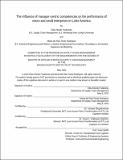| dc.description.abstract | According to an OECD report, micro and small enterprises (MSEs) constitute 99.5% of all firms in Latin America and employ approximately 60% of the LATAM population. However, despite their economic and social importance, MSEs are subject to high failure rates, primarily stemming from low productivity, lack of managerial skills and poor demonstration of supply chain management expertise. Therefore, the focus of this study is to evaluate which business competencies and integrative practices lead to the successful development of MSEs in Latin America using quantitative models such as principal component analysis, ordinary least-squares regression, and analysis of variance. The results show that the competencies integrated in a firm have only marginal direct effect (positive/negative) on firm performance. Significant effect is observed from supplier integration, customer integration and proactive innovativeness. However, when taken in context with the behaviors and actions of the manager, all competencies that are integrated in a firm showcased a significant effect on the selected performance parameters. Therefore, the study shows that (1) the performance of MSEs in Latin America is highly dependent on the interaction between firm competencies and the personal characteristics of the enterprise manager, and (2) to achieve higher levels of profitability and sales, managers must adjust their behaviors based on the different stakeholders they engage with. Effectively, managers must be conscious of their influence on firm performance as this significantly affects business growth in the long-term. | en_US |
